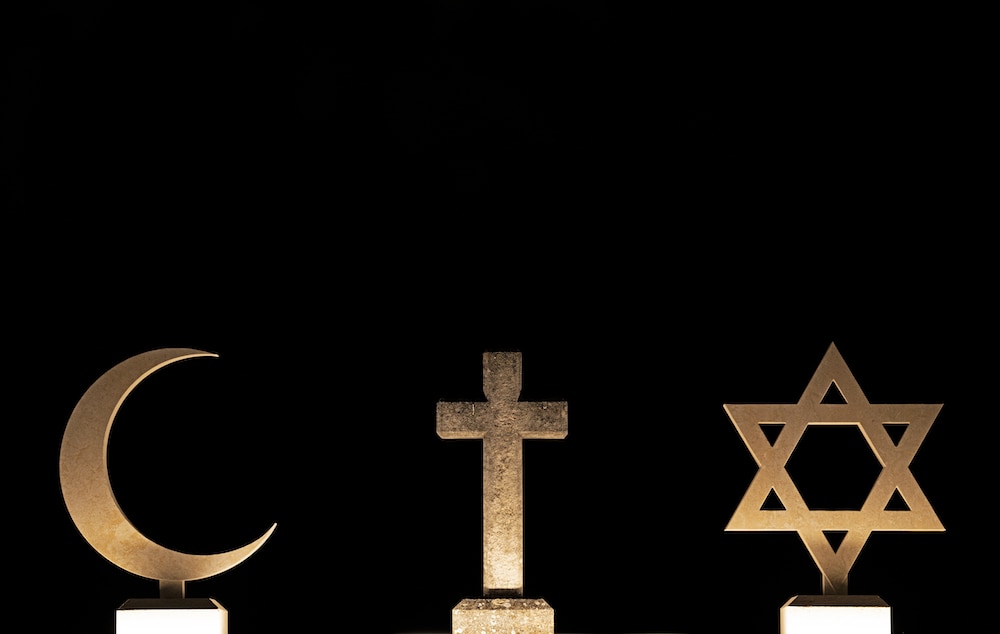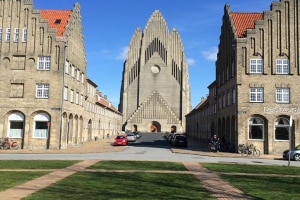
Sarmad Naveed, Toronto, Canada
So, a Jew, a Christian and a Muslim walk into an Eid celebration…
This sounds like the first part of a typical joke – because this scenario seems like it couldn’t actually be possible.
The current times would have you believe that the three major Abrahamic faiths are inherently at odds with one another.
Sure, there are differences in theology. But many might be surprised to learn that there is much more to unite these different faiths than they think.
Let’s just take one example – Eid al-Adha.
Eid al-Adha, or the ‘Festival of Sacrifice’, is an Islamic festival dating back to the time of its founder, the Holy Prophet Muhammad (sa). In the words of His Holiness Hazrat Mirza Masroor Ahmad (aba), the Fifth Caliph and Worldwide Head of the Ahmadiyya Muslim Community, ‘This Eid is in commemoration of the sacrifice a father, son and mother offered thousands of years ago.’ [1] This of course refers to the Prophet Abraham (as) and his family.
The Holy Qur’an – the revealed and ever-preserved word of God – provides a comprehensive introduction to the Prophet Abaraham (as):
‘Abraham was indeed a paragon of virtue, obedient to Allah, ever inclined to Him.’ [2]
More than just a claim, the Islamic tradition encapsulates how Abraham (as) achieved such lofty ranks, particularly through his profound acts of obedience and sacrifice.
For example, God commanded Abraham (as) to take his wife Hagar (as) and their son Ishmael (as) to ‘an uncultivable land’ and leave them there. [3] As the Prophet Abraham (as) walked away, his wife called after him, asking how she was to remain in a land with her child, where there was nothing and no one. Feeling the immense weight of the undertaking at hand, the Prophet Abraham (as) couldn’t bring himself to respond. After asking him a few times, a thought occurred to Hagar (as) and she asked, ‘Has God ordered you to do so?’ The Prophet Abraham (as) confirmed that he was following God’s instruction, upon which Hagar (as) responded with complete confidence, ‘Then He will not neglect us.’
Her confidence certainly wasn’t misplaced, because as she remained there alone with her son in a barren desert, she ran between two mountains in desperate search for water as her son cried of thirst. This mother cried out to the only One she knew could help her, and God miraculously procured a stream in the middle of a barren land. [4] It was in the same land – known as Makkah – where the Prophet Abraham (as) and his son re-established a House of God, a House that still stands today; the Holy Ka’bah.
This was no ordinary sacrifice. The glad tidings of a child were given to the Prophet Abraham (as) when he least expected it, in his old age. This miracle child must have been so dear to him; yet he was commanded to leave this child and his mother in the wilderness, without food or water. Without complete faith and trust in God Almighty, it would be nigh impossible to abandon them to the elements. Yet they all displayed the highest level of obedience and submission to the will of God.
This certainly wasn’t the only sacrifice made by the Prophet Abraham (as) and his family. In fact, there is another incident prior to this, in which the Prophet Abraham (as) and his son prepared themselves to make a sacrifice, which again demonstrated their willingness to obey God.
The Holy Qur’an records a dream in which the Prophet Abraham (as) was shown by God that he was slaughtering his son. When the Prophet Abraham (as) told Ishmael (as) about his dream, the young boy responded in a manner that reflected the lessons of fortitude in obedience he had learned from his parents, ‘O my father, do as thou art commanded.’ [5]
Speaking to Ishmael’s (as) preparedness to make such a massive sacrifice, His Holiness Hazrat Mirza Masroor Ahmad (aba) once explained,
‘Why was he prepared to make this sacrifice? It was because he had a unique understanding of what it means to love God Almighty. Due to this understanding, he developed within himself the zeal that this sacrifice is the means to our success. This developed both in the father and the son.’ [6]
And so, the father and son, motivated by their love for God, proceeded to fulfil what they were commanded. But just as Abraham (as) was about to go through with the sacrifice of his son, God called out to stop him, ‘O Abraham! Thou hast indeed fulfilled the dream,’ [7] after which God commanded a ram to be sacrificed instead. All of this was from God as ‘a manifest trial.’ [8]
But why was it necessary that the Prophet Abraham (as) be tested in this manner and be prepared to offer such sacrifices? Hazrat Mirza Ghulam Ahmad (as), the Promised Messiah and Founder of the Ahmadiyya Muslim Community explains,
‘The path of attaining nearness to God Almighty is to demonstrate sincerity. It was by doing this that the Prophet Abraham (as) attained nearness to God. Thus, God states:
“Abraham is he who was loyal.”’ [9], [10]
Today, the Abrahamic sacrifices are immortalised as key components of the Islamic pilgrimage to Makkah, called Hajj, where pilgrims circle the first house established for the purpose of worshipping the One God, which was rebuilt by Abraham (as) and Ishmael (as). Pilgrims run between the mountains of Safa and Marwah just as Hagar (as) did. Animals are sacrificed both at the conclusion of the pilgrimage, and as a key component of commemorating the festival of Eid al-Adha, just as Abraham (as) followed the command of God and sacrificed a ram after being prepared to sacrifice his son.
Practices are often passed on for generations as rituals to keep memories of the past alive. But as His Holiness Hazrat Mirza Masroor Ahmad (aba) explains, mere ritualistic sacrifice would actually be a disservice to the example set by the Prophet Abraham (as). He says:
‘These sacrifices are only considered true sacrifices in the sight of Allah the Almighty when they possess the same spirit of loyalty as that father and son; when the sole purpose is to attain virtue for the sake of Allah the Almighty and when, whilst treading with righteousness, the passion of sacrificing everything for the sake of Allah the Almighty surges forth. Without this, a physical sacrifice holds no meaning.’ [11]
That’s why every year, the Caliph of the Ahmadiyya Muslim Community reminds Muslims all around the world on the occasion of Eid al-Adha that when sacrificing animals, they must remember that the flesh of those animals doesn’t reach God, rather it’s the righteousness one strives to inculcate that is the true essence behind any sacrifice. [12]
But Eid al-Adha is an Islamic festival, so what could it possibly have to do with Judaism and Christianity?
Interestingly, mention of the Prophet Abraham’s (as) sacrifice is found not only in Islamic scripture, but also in the scriptures of both the Jewish and Christian traditions.
In the Jewish tradition, the Prophet Abrahamas is considered the first patriarch, a chosen man of God who inherently rejected idol worship and was drawn to believe that there is only One God. The Old Testament describes that ‘God tested Abraham’ by commanding him to take his son to Moriah and ‘offer him there as a burnt-offering.’ Genesis goes on to set the scene of when ‘Abraham reached out his hand and took the knife to kill his son.’ But just before he could go through with it, ‘the angel of the Lord called to him from heaven and said, “Abraham, Abraham…Do not lay your hand on the boy or do anything to him; for now I know that you fear God.”’ [13]
The Christian tradition also regards Abraham (as) as being a prophet of God, the Father of Faith, who, according to the Bible, was the first monotheist. The New Testament describes an incident where Abraham (as) was ‘put to the test’ in fulfilment of which he ‘was ready to offer up his only son.’ [14] The Book of James, recounting the time when ‘he offered his son’ describes it as an example of faith being accompanied by action. Prepared to make the ultimate sacrifice, Abraham (as) achieved the ultimate honour, ‘The scripture was fulfilled that says, “Abraham believed in God, and it was reckoned to him as righteousness,” and he was called the friend of God.’ [15]
What do these similarities mean?
They demonstrate that, although there may be doctrinal differences between the Abrahamic faiths, there are strong enough commonalities that can lead to a harmonious coexistence. Yes, there are some differences in accounts; for example, Judaic and Christian scriptures regard Isaac (as) as the son whom the Prophet Abraham (as) was prepared to sacrifice. However, Islam presents the view, corroborated by historical evidence, that Ishmael (as) was in fact the son referred to in the account. This would only make sense as the accounts refer to the Prophet Abraham (as) preparing to sacrifice his only son, which could only apply to Ishmael (as) as he was born some 13 years before Isaac (as). Nevertheless, there is common ground for the three major world religions in commemorating the spirit and lessons behind the Prophet Abraham’s (as) sacrifices.
One of the primary missions of the Holy Prophet Muhammad (sa), being the Seal of the Prophets, was to restore the honour of past prophets in the world. He declared that belief in all prophets of God is a core article of faith. In doing so, he created a space where the adherents of all prophets could unite and come together. The same goes for the Prophet Abraham (as), who Jews, Christians and Muslims unanimously agree to have been a staunch upholder of God’s unity. In fact, Abraham (as) holds a significantly special place for Muslims, because when praying for their holy master, the Holy Prophet Muhammad (sa), Muslims say, ‘O Allah, bless Muhammad and his people, as you blessed Abraham and his people’ and ‘O Allah, prosper Muhammad and his people, as you prospered Abraham and his people.’
And so, it would seem fitting for all to accept the Qur’anic invitation,
‘Say, “O People of the Book! Come to a word equal between us and you – that we worship none but Allah, and that we associate no partner with Him.”’ [16]
In this spirit, Eid al-Adha serves as an opportunity for Muslims, Jews, and Christians alike to honour the legacy of the Prophet Abraham (as); a legacy of making sacrifices to honour and uphold the unity of God. It’s a time to unite and revive that same spirit of devotion to the One God as was taught by Abraham (as) through his acts of obedience and sacrifice.
Ultimately, this unity among cousins in faith can become a manifestation of the Abrahamic prayer, ‘My Lord, make this a town of peace.’ Today, there’s not a corner of the world where those of the Abrahamic faiths do not reside. And in a world which seeks to fan the flames of division at all levels, including on the pretences of difference in faith, we have an opportunity to find commonalities and celebrate them.
So, it’s not a joke; a Jew, a Christian and a Muslim can indeed walk into an Eid celebration together.
About the Author: Sarmad Naveed is a missionary of the Ahmadiyya Muslim Community who graduated from the Ahmadiyya Institute for Languages and Theology in Canada. He serves as Online Editor and is on the Editorial Board for The Review of Religions, and also coordinates the Facts from Fiction section. He has also appeared as a panelist and host of programmes on Muslim Television Ahmadiyya (MTA) such as ‘Ahmadiyyat: Roots to Branches.’
ENDNOTES
1. Hazrat Mirza Masroor Ahmad (aba), Eid al-Adha Sermon, 22nd July 2022.
2. The Holy Qur’an 16:121.
3. The Holy Qur’an 14:38.
4. Sahih al-Bukhari, Hadith 3364.
5. The Holy Qur’an, 37:104.
6. Hazrat Mirza Masroor Ahmad (aba), Eid al-Adha Sermon, 31st July 2020.
7. The Holy Qur’an, 37:105-106.
8. The Holy Qur’an 37:107.
9. The Holy Qur’an, 53:38.
10. Hazrat Mirza Ghulam Ahmad (as), Malfuzat – Vol. IV (Farnham, Surrey: Islam International Publications Ltd., 2024), 429.
11. Hazrat Mirza Masroor Ahmad (aba), Eid al-Adha Sermon, 17th June 2024.
12. The Holy Qur’an, 22:38.
13. The Bible, Genesis 22:1-14.
14. The Bible, Hebrews 11:17.
15. The Bible, James 2:21-23.
16. The Holy Qur’an, 3:65.




Add Comment